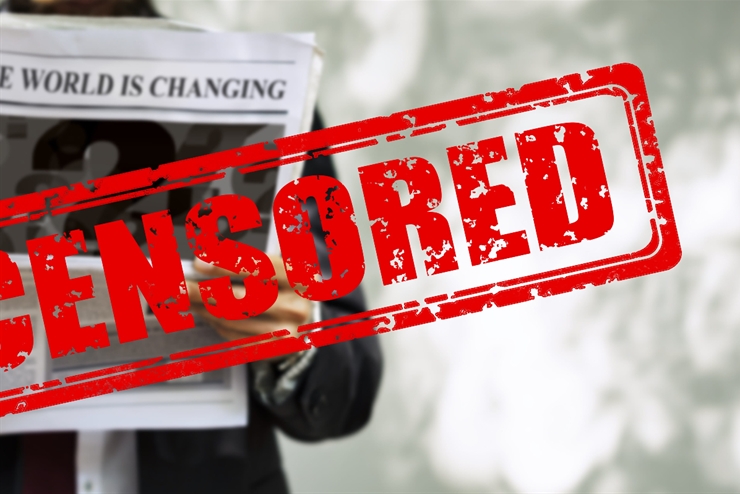Facebook has removed its mask and is playing censor-in-chief on the eve of the 2020 election.
On Monday morning, we found that none of the scheduled weekend posts of our alternative web publication, Intellectual Takeout, were released to the public. When attempting to post new material, Facebook informed us that restrictions are now in place to “help protect the community from spam.”
We had some warning this was coming. Last week, the social media giant informed of a “Restriction Period” in the week preceding the election that would restrict our distribution of “organic content or ads that might intimidate or discourage people from voting” or which violate its standards on “voter fraud and voter interference.”
This restriction came in spite of the fact that we had not changed the frequency, character, or tone of the articles we post. Intellectual Takeout is a part of Charlemagne Institute, a 501(c)(3) educational nonprofit that also publishes Chronicles: A Magazine of American Culture. We do not support specific candidates or political parties, and Intellectual Takeout is not ideological. We have a large audience with diverse political backgrounds. Though we feature articles and concepts that are typically right-of-center, we are not dogmatic and feature a range of ideas and authors. In fact, 60 percent of our audience is Democrat or Independent when matched against voter databases.
Below is a snapshot of the posts that were blocked, which contain a mix of content, some family-oriented and others critical of mainstream media coverage:

Trying to resume publication on Monday morning, we received the following message for the first time, saying our frequency of publication would be limited:

We emailed Facebook on Monday morning asking for more information about the reason for restricting our activity but have not yet received a reply.
“We have spent nearly 10 years building up our audiences,” Intellectual Takeout Publisher Devin Foley said. “We’ve noticed extreme changes in traffic around major elections, but we have never been blocked completely from posting to our Facebook pages, until today.”
Facebook has long been suspected of “shadow-banning” organizations with alternative viewpoints. Shadow-banning being a technique to slow the spread of published material by only presenting it to a small portion of a larger audience. Other social media platforms have also pursued this method, as well as outright bans. Facebook’s social media twin, Twitter, came under fire for a similar move when they restricted the New York Post’s account for reporting on the Hunter Biden computer scandal. Twitter backed down on Oct. 30, reinstating the Post’s account, but only after grounding it for two weeks.
Censorship extends beyond conservative-leaning entities like thePost. In late October, the socialist magazine Jacobin had an episode of its regular Weekends online streaming show censored and removed from Facebook. Jacobin’s publisher Bhaskar Sunkara took to Twitter, posting an image of Facebook’s message that read, “Your video is blocked and can’t be viewed by others.”
Additionally, liberal professor Bret Weinstein, made famous by his stance against “woke” college students at Evergreen College in 2017, recently announced that he had been evicted from Facebook. His account was later restored by the company, who claimed it was a fluke, but Weinstein isn’t buying it. Speaking about another’s deleted account over the weekend, Weinstein stated, “I strongly suspect there is a war going inside FB: Users who can’t be dismissed as conservative, yet won’t bend the knee to wokeness are in the crosshairs of one side.”
Foley said he believes the action of the Silicon Valley social media companies is “nothing more than a tyrannical attempt to silence independent voices.”
“It’s time for Congress to act on Big Tech, either they are platforms and cannot censor or they are publishers and should be treated as such,” Foley said. “With so many Americans using social media to learn and become informed, it is absolutely critical that all voices should be heard in our modern public square.”
The late author and historian Richard Weaver prophetically described this type of censorship in his essay Propaganda:
[T]here are certain methods of distortion and emotional appeal which are likely to go unrecognized by any except the most reflective minds. Of these, the most effective is the simple device of suppressing alternatives. All rational choice is a process of sorting over two or more alternatives and taking the one which seems to promise best; and democratic government rests upon a premise that the common man is capable of doing this. Propagandists long ago discovered that no such process can occur if only one alternative is supplied. By this method freedom of choice is stifled almost as completely as if coercion had been used.
For entities like Intellectual Takeout, The New York Post, Jacobin, and others, Richard Weaver’s prophesy is coming true before our very eyes.
(Annie Holmquist is the editor of Intellectual Takeout. Intellectual Takeout Editorial Assistant Anders Koskinen contributed to this article.)
Image Credit:
[Image from pxfuel.com – royalty free stock photos CC/0 / in the Public Domain, cropped and resized]

Leave a Reply